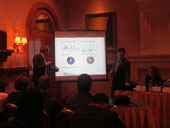


Tuesday, March 4


Are you satisfied with the accountability of public officials and transparency of their offices? Do you want to know where the money you pay as taxes goes? Are you interested in learning more about the efficiency and effectiveness of new projects and policies? If “yes” – the renewed opendata.ge is the right place for you.
The user-friendly bilingual webpage provides information on how state institutions operate, how they spend public funds and fulfill state targeted programs, as well as the performance of public servants and their incomes and benefits to the public through its simple navigation system.
As the most voluminous online database in Georgia, the portal serves to improve the level of transparency and accountability of the government.
By the initiative of the Open Society Georgia Foundation (OSGF) opendata.ge unites public information requested and collected by the Institute for Development and Freedom of Information (IDFI), Georgian Young Lawyers’ Association (GYLA), Transparency International - Georgia (TI-G) and Association Green Alternative as a unique single portal of NGOs involved in promoting freedom of information.
Presenting the portal to the public on February 27, Executive Director of the OSGF Keti Khutsishvili said it is important that the four NGOs united to encourage the citizens’ accessibility to public information and ensure the government’s accountability to public.
“In terms of freedom of information, we can say that Georgia has made some progress, but a lot of things still need to be done and improved,” Khutsishvili stated.
Opendata.ge, initially operated by IDFI, was an important platform for receiving public information, which would frequently become a hot topic among civil society and political circles.
Representative of the Ministry of Justice Rusudan Mikelidze welcomed the “united coalition” of NGOs working to promote ‘open data’. She said this webpage is important for the country in terms of increasing the level of state accountability. “This is the issue where the government and NGOs should be working hand-in-hand,” Mikelidze said, stressing that the government has moved to a new level of transparency because if in past years there was a problem with publishing data, now the government is proactively displaying public information.
Chairman of the Board/Projects Director of IDFI, Levan Avalishvili, said the webpage has a high number of visitors every day, including ordinary citizens, journalists and public servants.
Avalishvili said this is a good mechanism for public control over the government, because this database should not be considered as a source for scandalous information, but rather this is designed for information that belongs to the people. He said this is the information that reflects the life of our administration so that the more information is available, and the more diverse this information becomes, the better.
Executive Director of TI Georgia Eka Gigauri said opendata.ge is targeted at each and every person who wants to effectively monitor the activities of state officials. Gigauri said this portal would greatly assist in the development of investigative journalism as a source of interesting materials that may become the subject of further investigation. Talking on the example of her organization, Gigauri said this is only after analyzing the data that TI Georgia carries out recommendations.
“We, TI Georgia, are happy to share all the data we receive from state institutions with everyone,” Giaguri said, stressing that the information is indeed a great power in the hands of every citizen.
Head of the GYLA Kakha Kozhoridze said that, on the one hand, the public has the right to receive information, while, on the other hand, state institutions have an obligation to distribute such information. “It is not a matter of goodwill, but rather a constitutional obligation,” Kohzoridze said, stressing that accessibility to public information has even positively affected the activities of these organizations in recent years.
He said GYLA or other NGOs do not aim at seeming critical but rather they want their activities to positively reflect on the current events on the country. He said now the public will have an opportunity to use the information the four NGOs will share on opendata.ge.
Kozhoridze said that with their “objective criticism” they also try to assist the government to follow its obligation to proactively publish information (that has entered the force from January 1, 2014) so that less people would demand the same information.
Kozhoridze compared the portal with a huge window. “Of course in a closed environment where there are no windows the possibility for spreading viruses is higher, but when we open these windows the risk of spreading viruses significantly decreases,” Kohzoridze said.
Representative of Association Green Alternative spoke about the “double standards” exercised towards regional organizations in the past, which found it harder to obtain the necessary public information compared to the GYLA, Green Alternative or any other more popular NGO. She said now opendata.ge would not only raise public awareness, but also the competitiveness among the public institutions.
Specialists from the international organization HURIDOCS who helped their Georgian colleagues update and modify the platform explained the essence of opendata.ge to the public including how the portal operates, and the ways for searching the necessary information.
For more details about the portal you can visit www.opendata.ge.